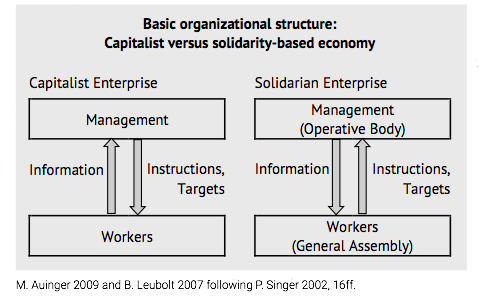As Paul Singer, the former Brazilian Secretary of State for Solidarity Economy put it: “The Essence of Solidarity Economy is democracy”. In capitalist firms it is the amount of capital held by individual shareholders that determines who makes the decisions. In SSE cooperatives – depending on the type of SSE project – the workers, the consumers, the users of services etc. have their say on the basis of “one person – one vote”. This does not necessarily mean that a general assembly always takes the main decisions once a year and delegates the decision-making to a Board of Directors. This is just one possibility. Nor does it mean that every single decision is always taken together by unanimous consensus. In practice there are a variety of different ways of exercising democratic governance and joint decision-making. The important thing is that democracy and participation do not simply exist of their own accord. They have to be lived, learned and experienced collectively again and again.

Democratic meetings – the core of Social Solidarity Economy
Democratic meetings lie at the center of Social Solidarity Economy. This is where democratic decisions are made. The circle symbolizes the idea that each person has the same say and the same vote since people in SSE treat each other equally. The sociocratic approach reminds us that it is of great importance that everyone is effectively heard, that everybody can utter what she/he thinks. Therefore it is very important that each and every person in the circle has the right to ask questions, express their opinion on an issue and utter his/her concerns, ideas,… If only those raise their hands and say something who are used to speaking out in front of others or who have more experience in expressing their opinions there might be a lack of democracy and participation.
Democratic meetings are crucial and it is therefore necessary for the group of individuals to develop skills. There is not a head or a leader, instead there is the role of a facilitator / moderator. The way a facilitator prepares the agenda and moderates the meeting is of great importance. It is a role that should not be left to (always the same) experienced persons but it seems good that everyone learns how to do this. By this means, “power” is being de-centralized and evenly shared among “equals”. To learn more about democratic meetings and decision-making please also see chapter 2 in this brochure on “community building”.